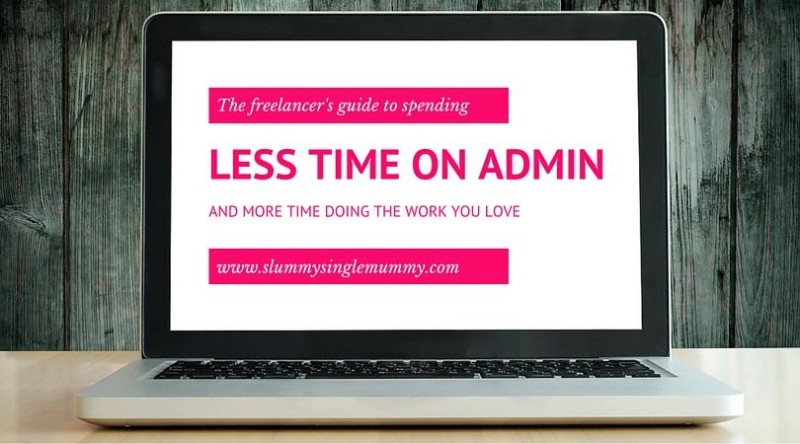When people ask me what I do for a living, I’ll often give a different answer depending on my mood or the person I’m talking to. This isn’t because I have some sort of personality disorder, it’s just that sometimes I find it hard to define.
For example, if I’m talking to someone I think is a bit trendy, I’ll probably just say ‘I’m a writer’, in a slightly deeper than normal voice, and try to look a bit anguished, as though it’s my ‘calling’ and I can’t help but be anything else.
If I’m talking to an older businessman, I’ll say I’m a consultant or trainer, to sound super professional, and if I’m talking to someone I’ve not really taken a shine too, I might say ‘I’m a blogger’, just to confuse them, as no one really understands how you make a living from that.
All of these definitions are true.
I never say ‘I’m a bookkeeper’ or ‘I’m an administrator’ or ‘I’m an office manager’, even though all of these definitions are technically true as well. When you work for yourself, you end up spending a lot of time on admin tasks, and not as much time as you originally imagined you might on the work you actually enjoy.
Before I became self-employed, my freelancing dreams involved me, sat outside a beautiful cafe on a sunny day, sipping an espresso, (even though I don’t actually like espresso), and working on my latest hilarious column for The Guardian. Nowhere in the fantasy was there a pile of crumpled receipts or a reminder to renew my business insurance.
So where did it all go wrong?
Well of course it didn’t go wrong. The reality is that as a freelancer you do just have to do all of these things. The secret is to do them quickly and well, and to factor in this time when you price your work. If you know for example that out of the 250 odd weekdays in a year, 150 of these are going to be taken up by admin, marketing, holidays and other non-paid work, then make sure that your day rate is 100th of what you’d like to turnover in the year.
How not to manage your admin
Back then to the ‘quickly and well’ bit. This is where I fall down.
It seems to me, from keeping an eye over the last week on how I spend my time, that things fall into two key camps:
- Things that you need to set aside specific time to do
- Things that you need to do as they come in and not leave in a big pile
Unfortunately I seem to get these completely the wrong way round. For example, everyone knows that emails are a massive distraction, and are best dealt with in bulk at particular times of the day, and yet I have clicked away from writing this to look at emails five times already.
Receipts on the other hand, are best organised as soon as you get them, by taking a quick scan of them on your phone or noting the amount somewhere and filing them. Invoices too, should have details added to a spreadsheet when you send them, so you can track them easily. You shouldn’t have to spend a day every few months sorting everything out, and realising you’ve not invoiced at all for several key bits of work.
Also, I spent a disproportionate amount of time this week trying to make my desk look pretty.
How to be better at admin
So, now you know how not to do it, (i.e. like me), here are some tips, based on my observations of myself over the last week, to help you learn how to manage your business admin a little more effectively.
Put a system in place to manage your finances
Finances really don’t have to be complicated but a lot of people find them really scary. You can conquer the fear by taking charge. Set up a really simple spreadsheet, and, more importantly, keep it up to date. Whenever you invoice someone, write it down. Whenever you get paid, write it down. An app to scan in your receipts as you get them is really useful, as you can do it there and then, with your phone, at the checkout, and not have to worry about them being lost in the wash in a trouser pocket. (Definitely doesn’t happen to me all the time…)
Although not an essential if you’re a sole trader, you might find it useful to have a separate business bank account for work, so that you can more easily separate income and expenditure, and get a clearer idea of business cash flow. I recently joined the Federation of Small Businesses and noticed that they offer a completely free business account with The Cooperative Bank. Business banking fees have put me off in the past, so I’ll definitely be looking into this.
Learn to focus
One thing that was abundantly clear from observing my work habits for a week was that I am not good at concentrating on one thing. I have masses open on my computer at any one time and am constantly flicking between tasks. It’s not uncommon for me to be mid-sentence, and then switch windows because I’ve suddenly remembered I need to send an invoice or want to do some research into business networking events.
With research showing though that a wandering mind makes us less happy, we could probably benefit personally as well as professionally from focussing more on one task at a time. This is a list of 10 really cool looking online tools to help you concentrate, although you could go low tech and set a timer – pick one admin task you’ve been putting off, do it for just twenty minutes, and you’ll be surprised how quickly the time goes once you focus. If you can manage it, try to only check emails at intervals throughout the day rather than having them constantly in the background.
If you work for lots of different clients on an hourly rate then Focus Booster looks like it could be a really useful tool. Try Stay Focused if wasting time online is your downfall.
Don’t feel you have to be an expert in everything
You are good at what you do. If you weren’t, you wouldn’t have chosen to set up a business doing it. (If you’re not any good at whatever it is, top tip – it might be time for a rethink.) However, just because you might be incredibly passionate about plants, or a super skilled stylist, doesn’t mean you’re necessarily going to be any good at accounts or insurance or any of the other boring things that go along with running your own business.
Although it can feel like a big expense, paying someone else to do the bits you’re rubbish at can actually save you money in the long term, as it frees you up to earn more money doing the stuff you’re ace at. Think about it – it might take you a whole day every month to struggle through your bookkeeping, and in that time you could earn more than enough to pay an efficient bookkeeper, as they’ll probably be able to do the same job in an hour.
Similarly, look to organisations like the Federation of Small Businesses, where you can tap into expert knowledge and advice without having to fork out on paying an outsider. They offer members loads of benefits, including health and safety advice, insurance, workplace pensions, free support with emotional and physical health problems, and access to services such as telecoms, printing and banking. It’s basically like having your own back office, freeing up your time to concentrate on what you love.
What are your top tips for managing your business admin?
Sponsored post. Image credits – d8nn, Africa Studio, sergign, patpitchaya and BrAt82 – all from shutterstock.






This post basically sums up my method of working too!! I’m glad I’m not the only on with a multi tasking/concentration switching/taking too much on at the same time style of working! Some good tips, thank you! x
So glad it’s not just me with the distractions! I think the worst thing about doing social media work is that you legitimately have to be on Twitter and Facebook and it’s SO EASY to get distracted. Great organisational tips, need to start being better at admin x
Ohhh I really need to get better at sorting out my receipts. I’m hopeless. My desk isn’t particularly pretty/tidy at the moment either…
oh god I need to be better at admin, I feel so swamped by it all but I just keep putting it off and my filing system is pretty much a drawer full of receipts agh! x